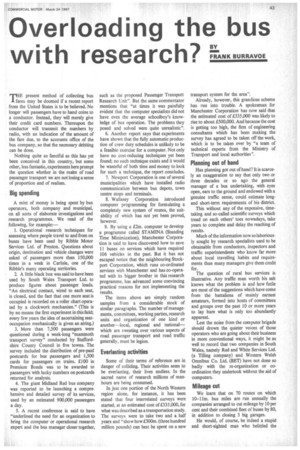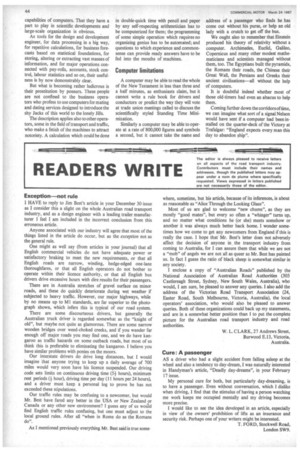Overloading the bus with research? IANK BURRAV"
Page 45

Page 46

If you've noticed an error in this article please click here to report it so we can fix it.
'THE present method of collecting bus I fares may be doomed if a recent report from the United States is to be believed. No longer will passengers have to hand coins to a conductor. Instead, they will merely give their credit card numbers. Thereupon the conductor will transmit the numbers by radio, with an indication of the amount of the fare due, to the accounts office of the bus company, so that the necessary debiting can be done.
Nothing quite so fanciful as this has yet been conceived in this country, but some other, less fantastic, experiments here prompt the question whether in the realm of road passenger transport we are not losing a sense of proportion and of realism.
Big spending
A mint of money is being spent by bus operators, both company and municipal, on all sorts of elaborate investigations and research programmes. We read of the following, for example:— 1. Operational research techniques for assessing where people travel to and from on buses have been used by Ribble Motor Services Ltd. of Preston. Questions about origin, destination and vehicle changes were asked of passengers more than 150,000 times in a week in Carlisle, one of the Ribble's many operating territories.
2. A little black box was said to have been used by South Wales Transport Ltd. to produce figures about passenger loads.
"An electrical contact, wired to each seat, is closed, and the fact that one more seat is occupied is recorded on a roller chart opera ted by a clockwork mechanism." (This is by no means the first experiment in this field; every few years the idea of ascertaining seat occupation mechanically is given an airing.) 3. More than 7,500 passengers were questioned during a week-long "mammoth transport survey" conducted by Stafford shire County Council in five towns. The survey included the distribution of pre-paid postcards for bus passengers and 1,500 cards for passengers on trains. £100 in Premium Bonds was to be awarded to passengers with lucky numbers on postcards returned for analysis.
4. The giant Midland Red bus company was reported to be launching a compre hensive and detailed survey of its services, used by an estimated 900,000 passengers a day.
5. A recent conference is said to have "Underlined the need for an organization to bring the computer or operational research expert and the bus manager closer together, such as the proposed Passenger Transport Research Unit". But the same commentator mentions that "at times it was painfully evident that the computer specialists did not have even the average schoolboy's knowledge of bus operation. The problems they posed and solved were quite unrealistic".
6. Another report says that experiments have shown that the fully automatic production of crew duty schedules is unlikely to be a feasible exercise for a computer. Not only have no cost-reducing techniques yet been found; no such technique exists and it would be wasteful of both time and money to look for such a technique, the report concludes.
7. Newport Corporation is one of several municipalities which have installed radio communication between bus depots, town centre stops and terminals.
8. Wallasey Corporation introduced computer programming for formulating a completely new system of routes, the suitability of which has not yet been proved, however.
9. By using a £2m. computer to develop a programme called STAMINA (Standing Time Minimization), Manchester Corporation is said to have discovered how to save 11 buses on services which have required 106 vehicles in the past. But it has not escaped notice that the neighbouring Stockport Corporation, which runs co-ordinated services with Manchester and has co-operated with its bigger brother in this research programme, has advanced some convincing practical reasons for not implementing the results.
The items above are simply random samples from a considerable stock of similar paragraphs. The number of managements, committees, working parties, research units and organization of one kind or another—local, regional and national— which are sweating over various aspects of road passenger transport and road traffic generally, must be legion.
Everlasting activities
Some of their terms of reference are in danger of colliding. Their activities seem to be everlasting, their lives endless. In the sacred name of research millions of manhours are being consumed.
In just one portion of the North Western region alone, for instance, it has been stated that four interrelated surveys were started, at an estimated cost of £335,000, for what was described as a transportation study. The surveys were to take two and a half years and "show how £300m. (three hundred million pounds) can best be spent on a new transport system for the area".
Already, however, this grandiose scheme has run into trouble. A spokesman for Manchester Corporation has now said that the estimated cost of £335,000 was likely to rise to about £500,000. And because the cost is getting too high, the firm of engineering consultants which has been making the survey has agreed to be taken off the work, which is to be taken over by "a team of technical experts from the Ministry of Transport and local authorities".
Planning out of hand
Has planning got out of hand? It is scarcely an exaggeration to say that only two or three decades or so ago the general manager of a bus undertaking, with eyes open, ears to the ground and endowed with a genuine traffic sense, could estimate longand short-term requirements of his district.
This without any of the expensive, timetaking and so-called scientific surveys which tread on each others' toes nowadays, take years to complete and delay the reaching of results.
Much of the information now so laboriously sought by research specialists used to be obtainable from conductors, inspectors and traffic superintendents who know far more about local travelling habits and requirements than many managers give them credit for.
The question of rural bus services is illustrative. Any traffic man worth his salt knows what the problem is and how futile are most of the suggestions which have come from the battalions of mainly earnest amateurs, formed into hosts of committees and groups over the past 10 or more years to lay bare what is only too abundantly apparent. • Lest the noise from the computer brigade should drown the quieter voices of those operators who are going about their business in more conventional ways, it might be as well to record that two companies in South Wales, namely Red and White Services Ltd. (a Tilling company) and Western Welsh Omnibus Co. Ltd. (BET) have not done so badly with the re-organization or coordination they undertook without the aid of computers.
Mileage cut
We learn that on 70 routes on which 10-11m. bus miles are run annually the companies arranged to cut mileage by 10 per cent and their combined fleet of buses by 80, in addition to closing 3 big garages.
He would, of course, be indeed a stupid and short-sighted man who belittled the capabilities of computers. That they have a part to play in scientific developments and large-scale organization is obvious.
As tools for the design and development engineer, for data processing in a big way, for repetitive calculations, for business forecasts based on statistical foundations, for storing, altering or extracting vast masses of information, and for major operations connected with pay-rolls, accounts, stock control, labour statistics and so on, their usefulness is by now demonstrably clear.
But what is becoming rather ludicrous is their prostitution by poseurs. These people are not confined to the business operators who profess to use computers for mating and dating services designed to introduce the shy Jacks of this world to the lonely Jills.
The description applies also to other operators, some in the field of transport and traffic, who make a fetish of the machines to attract notoriety. A calculation which could be done in double-quick time with pencil and paper by any self-respecting arithmetician has to be computerized for them; the programming of some simple operation which requires no organizing genius has to be automated; and questions to which experience and commonsense can provide ready answers have to be fed into the mouths of machines.
Computer limitations
A computer may be able to read the whole of the New Testament in less than three and a half minutes, as enthusiasts claim, but it cannot write a rule book for drivers and conductors or predict the way they will vote at trade union meetings called to discuss the scientifically styled Standing Time Minimization.
Similarly a computer may be able to operate at a rate of 800,000 figures and symbols a second, but it cannot take the name and address of a passenger who finds he has come out without his purse, or help an old lady with a crutch to get off the bus.
We ought also to remember that Einstein produced his theory of relativity without a computer. Archimedes, Euclid, Galileo, Copernicus and many other modest mathematicians and scientists managed without them, too. The Egyptians built the pyramids, the Romans their roads, the Chinese their Great Wall, the Persians and Greeks their ancient civilisations—all without the help of computers.
It is doubtful indeed whether most of those old-timers had even an abacus to help them.
Coming further down the corridors of time, we can imagine what sort of a signal Nelson would have sent if a computer had been installed on the quarter-deck of the Victory at Trafalgar: "England expects every man this day to abandon ship".








































































































